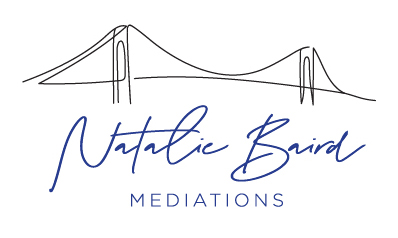At this time Natalie is offering mediation services only
 If you are looking for a virtual divorce mediator in Tampa Bay, Natalie Baird Mediations would like to assist you with your divorce. Natalie Baird is both a Supreme Court Certified divorce mediator and a Board Certified Attorney focusing on Family Law. Using virtual mediation, both parties can meet privately via online video chat. This is an extremely safe alternative to meeting in person, in an office. Natalie Baird is one of the few divorce mediators that does online divorce mediation in the Tampa Bay area.
If you are looking for a virtual divorce mediator in Tampa Bay, Natalie Baird Mediations would like to assist you with your divorce. Natalie Baird is both a Supreme Court Certified divorce mediator and a Board Certified Attorney focusing on Family Law. Using virtual mediation, both parties can meet privately via online video chat. This is an extremely safe alternative to meeting in person, in an office. Natalie Baird is one of the few divorce mediators that does online divorce mediation in the Tampa Bay area.
A divorce mediator is a neutral third party that does not represent any single person but rather works with both parties to achieve an amicable outcome during the divorce.
The mediator can provide legal information, however, the decision-making is in the hands of you and your spouse.
If you are looking for a mediator in Tampa, St. Petersburg, or Clearwater, you might have a couple of questions:
- What happens at a divorce mediation?
- What do you talk about at a divorce mediation?
- What do I do before a divorce mediation?
After you give some information to Natalie Baird, she will work with both you and your spouse to outline all of the issues that are important to each party. Issues that are important to you are probably also important to your spouse. Natalie will coordinate the discussion and help to achieve an agreement between your spouse and yourself. The goal of mediation is to come to an agreement without going to court.
What do you talk about at a divorce mediation?
Issues such as children and co-parenting, marital assets, real estate in Tampa, St. Petersburg or Clearwater, and shared personal debt are very common concerns in many divorce cases.
How do I prepare for a divorce mediation
A divorce is a complicated legal issue. A marriage is ending and there will be a lot of discussion about how to amicably close this chapter in your life. Divorce is certainly stressful. Natalie Baird Mediations’ goal is to help you and your spouse communicate effectively and respectfully.
You will need to gather all of your financial information. This includes W-2 tax forms from your work in the Tampa or Clearwater area, pay stubs, real estate documentation, and investment information. Each situation is slightly different, so if there is anything else needed, Natalie will notify you before your mediation date.
If you are interested in a virtual mediation, rather than a traditional in-person mediation, please fill out the form to the right or you can give us a call at 813-440-9975. Natalie Baird Mediations in Tampa looks forward to assisting you with your divorce.
Who Controls the Process
Collaborative:
You and your spouse control the process and make final decision
Litigation:
Judge controls process and makes final decisions
Degree of Adversity
Collaborative:
You and your spouse pledge mutual respect and openness.
Litigation:
Court process is based on an adversarial system
Cost
Collaborative:
Costs are manageable, usually less expensive than litigation; team model is financially efficient in use of expert
Litigation:
Costs are unpredictable and can escalate rapidly including frequency of post-judgement litigation
Timetable
Collaborative:
You and your spouse create the timetable
Litigation:
Judge sets the timetable: often delays given crowded court calendar
Use of Outside Experts
Collaborative:
Jointly retained specialists provide information and guidance helping you and your spouse develop informed, mutually beneficial solution
Litigation:
Separate experts are hired to support the litigants’ positions, often at a great expense to each
Involvement of Lawyers
Collaborative:
Your lawyers work toward a mutually created settlement
Litigation:
Lawyers fight to win, but someone will lose
Privacy
Collaborative:
The process and discussion or negotiation details are kept private
Litigation:
Dispute becomes a matter of public record and sometimes media attention
Facilitation of Communication
Collaborative:
Team of collaborative practice specialists educate and assist you and your spouse on how to effectively communicate with each other
Litigation:
No process designed to facilitate communication
Voluntary vs. Mandatory
Collaborative:
Voluntary
Litigation:
Mandatory if no agreement
Lines of Communication
Collaborative:
You and your spouse communicate directly with the assistance of members of your team
Litigation:
You and your spouse negotiate through your lawyers
Court involvement
Collaborative:
Outside court
Litigation:
Court-based
